

This 23-Minute Morning Ritual Will Transform Your Whole Day. What knitting is doing to your health that you probably never knew about. While everyone is out looking for new ways to be healthy, you may already have a healthy habit right at your fingertips — literally.
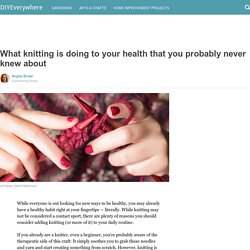
While knitting may not be considered a contact sport, there are plenty of reasons you should consider adding knitting (or more of it) to your daily routine. If you already are a knitter, even a beginner, you're probably aware of the therapeutic side of this craft: It simply soothes you to grab those needles and yarn and start creating something from scratch. However, knitting is even more beneficial than it would appear, and we've gathered some of those benefits below: 1. Knitting relieves stress. Why your brain wants you knitting. Image via the Boston Museum of Science.
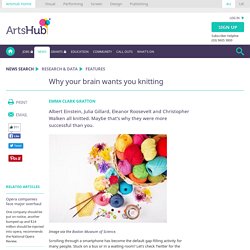
Scrolling through a smartphone has become the default gap-filling activity for many people. Stuck on a bus or in a waiting room? Let’s check Twitter for the eighth time this morning. But having something to do with your hands that doesn’t involve an iDevice can be much better for your brain. Freeing yourself from constant sensory input, and allowing your mind to wander enables space for creativity.
Use This 10-Breath Trick to Make Your Sad and Anxious Thoughts Melt Away : The Hearty Soul. This article was shared with permission from our friends at elephantjournal.com.
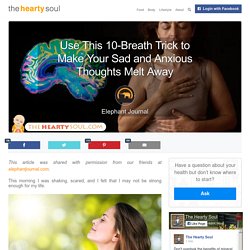
This morning I was shaking, scared, and I felt that I may not be strong enough for my life. I brought one hand to my stomach and one hand to my heart and I remembered, Here I am. Janov's Reflections on the Human Condition: Why Primal Pain Endures. Art Janov, one of the pioneers of fetal and early infant experiences and future mental health issues, offers a robust vision of how the earliest traumas of life can percolate through the brains, minds and lives of individuals.
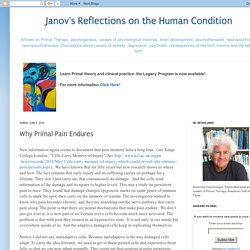
He focuses on both the shifting tides of brain emotional systems and the life-long consequences that can result, as well as the novel interventions, and clinical understanding, that need to be implemented in order to bring about the brain-mind changes that can restore affective equanimity. The transitions from feelings of persistent affective turmoil to psychological wholeness, requires both an understanding of the brain changes and a therapist that can work with the affective mind at primary-process levels.
Life Before Birth, is a manifesto that provides a robust argument for increasing attention to the neuro-mental lives of fetuses and infants, and the widespread ramifications on mental health if we do not. Jaak Panksepp, Ph.D. Washington State University Dr. Sign Up. Your Brain Has A "Delete" Button. Will wearing a ratty college T-shirt and sweats to bed soon go out of fashion?
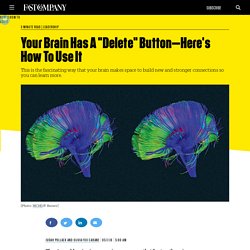
The pajamas industry is growing, and retailers aren't sleeping on how to reinvent the bygone ensemble. What was once a symbol of buttoned-down '50s attire (think Ricky and Lucy in collared PJ sets, tucking into their separate beds) has slowly inched its way back into pop culture. Look no further than popular TV shows—New Girl, House of Cards, or Scandal—to see protagonists clad in chic silk or cotton designs reminiscent of a tidier bedtime era. But while earlier decades cherished the ensemble for its conservatism, today's pajamas differ in terms of comfort, style, and intent. For consumers, the revival is partially inspired by recent Fashion Week runways, an overall trend toward healthier living, increased awareness of the benefits of sleep, and fresh new takes on vintage designs. It Didn’t Start With You: How Inherited Family Trauma Shapes Who We Are. By Mark Wolynn Traumas Lost and Found The past is never dead.
Why Your Brain Needs More Downtime. Every now and then during the workweek—usually around three in the afternoon—a familiar ache begins to saturate my forehead and pool in my temples.
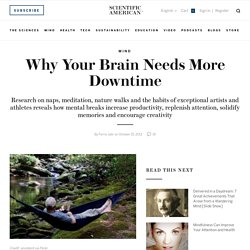
The glare of my computer screen appears to suddenly intensify. My eyes trace the contour of the same sentence two or three times, yet I fail to extract its meaning. Being Lonely Can Warp Your Health And Your Genes. Loneliness has been linked to everything from heart disease to Alzheimer's disease.
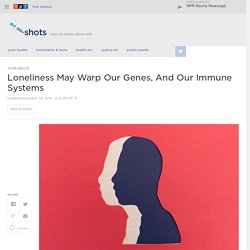
Depression is common among the lonely. The second brain - All In The Mind. Lynne Malcolm: Hi, it's All in the Mind on RN, I'm Lynne Malcolm in this Science Week 2015.
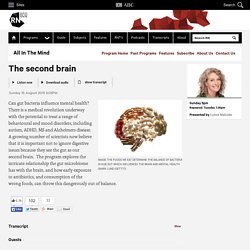
Today, why the gut has been dubbed our second brain. Alternate Nostril Breathing. Alternate Nostril Breathing, also known as Nadi Shodhana, is an extremely effective stress relief tool.
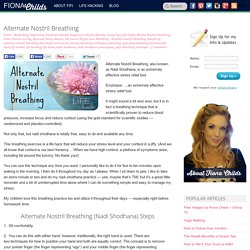
Emphasis: …an extremely effective stress relief tool. It might sound a bit woo woo, but it is in fact a breathing technique that is scientifically proven to reduce blood pressure, increase focus and reduce cortisol (using the gold standard for scientific studies — randomized and placebo-controlled). Not only that, but nadi shodhana is totally free, easy to do and available any time. This breathing exercise is a life hack that will reduce your stress level and your cortisol in a jiffy.
Stanford's Robert Sapolsky Demystifies Depression. We know that depression affects people from all walks of life.

Rich. Poor. The Science of Sleep: Dreaming, Depression, and How REM Sleep Regulates Negative Emotions. By Maria Popova “Memory is never a precise duplicate of the original… it is a continuing act of creation. Dream images are the product of that creation.” For the past half-century, sleep researcher Rosalind D. Cartwright has produced some of the most compelling and influential work in the field, enlisting modern science in revising and expanding the theories of Jung and Freud about the role of sleep and dreams in our lives. In The Twenty-four Hour Mind: The Role of Sleep and Dreaming in Our Emotional Lives (public library), Cartwright offers an absorbing history of sleep research, at once revealing how far we’ve come in understanding this vital third of our lives and how much still remains outside our grasp. Hit the Reset Button in Your Brain. Photo THIS month, many Americans will take time off from work to go on vacation, catch up on household projects and simply be with family and friends.
And many of us will feel guilty for doing so. Hello My team and I recently joined HR leaders at the Asia-Pacific HR Summit. A pressing topic for organisations is the ongoing challenge of managing change. My keynote presentation about the neuroscience of change was keenly attended and we heard success strategies from organisations such as Campbell Arnott’s, CNH Industrial and QBE. The past couple of months have been full of growth and change for the Langley Group. Your Mind & Body Are Not Separate. This Chart Explains It All. The Brain Does NOT Create Consciousness. Why We Procrastinate. Pineal Gland and Activating Your Third Eye. The Brain Science Behind Gut Decisions.
Train Your Brain To Let Go Of Habits – 10 Methods For Creating New Neural Pathways. When you understand how neural pathways are created in the brain, you get a front row seat for truly comprehending how to let go of habits. Neural pathways are like superhighways of nerve cells that transmit messages. How Long To Nap For The Biggest Brain Benefits.
How Stories Change the Brain. Five Surprising Ways Oxytocin Shapes Your Social Life. It’s been called the cuddle hormone, the holiday hormone, the moral molecule, and more—but new research suggests that oxytocin needs some new nicknames. Like maybe the conformity hormone, or perhaps the America-Number-One! Www.langleygroup.com.au/images/Neuroscience-of-creative-insight_Langley_2013.pdf. Langley Group. The Power Of Thought: Alter Your Genes and Cure any Disease. Cellular Biologist Bruce Lipton believes that humans can control their genes by changing their environment.